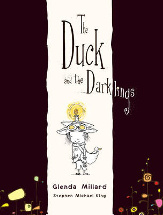The duck and the Darklings by Glenda Millard

Ill. by Stephen Michael King. Allen and Unwin, 2014. ISBN
978743312612.
(Age: 6+) Highly recommended. Friendship. Future. Love. Rather than
concentrating on the mess the world has become, Millard shows what
can happen when people have hope. Grandpapa has memories he cannot
express, he is critical of bringing the duck down into their dark
place, but the young boy keeps the duck which then leads them to the
light, to the world which has become usable again, showing signs of
revival.
Peterboy is one of a group of Darklings who live beneath the earth's
surface, down in its deep dark places, needing hats with candles to
find their way. But they need their candles above ground too, as the
place has become blighted, tainted with overuse, the place the
Darklings go to scavenge what they can to survive below. The boy
finds an injured duck and despite knowing that Grandpapa will
grumble, takes the animal down to the Dark. It becomes well,
repaying their kindness with eggs. But Grandpapa has warned that
when the winds blow, the bird will leave, and one day it climbs
above ground and with the boy watches for the light that will show
its path. Peterboy convinces Grandpapa to remember and tell the
tales of long ago, but still Idaduck stays. When the light does not
appear, Grandpapa decides to hold a farewell party for the duck and
in doing so, everyone sees that the earth has renewed herself,
dressing herself in forests and trees.
Millard's prose is exceptional, taking us down to the depths of the
cave the sorry place, while the boy above ground uses his spiderling
fingers to seek the things to take below, their language almost as
forgotten as Grandpapa's disremembered stories of the past. Millard
builds the word images carefully, each phrase resonating with the
spoiled atmosphere above, memorialising what it has become through
her use of language. Stephen Michael King has painted the world
described by Millard with passion. The muck hills over which the boy
climbs each day to scavenge remind the reader of the hills of
rubbish many children climb each day for food and goods to sell, the
chairs that Grandpapa sits on are assemblages of flotsom from the
world above, and their clothes put together from a scrap bag of
castoffs and found objects. The Darklings are small, pen drawn in
the mess of black ink that denotes the underground passages they
call home. Above ground colour begins to appear as Grandpapa
remembers his stories and the duck finds enough light to guide her
path.
This is a glowing story of friendship and family, of renewal and
hope. It is a masterful picture book which speaks of sadness and
loss, of a world blighted by the actions of previous generations,
but offers hope for the future. A book which gives more each time it
is read.
Fran Knight